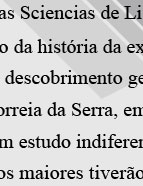

................................
The need to reorganise sources was also felt by António Ferrão, who was inspired by his visit to the historical archives of the French Ministry of Foreign Affairs. He published his reflections regarding Da importância dos documentos diplomáticos em História [The Importance of Diplomatic Documents in History] (1917) and presented a proposal to the Academy of Sciences advocating for the uniform organisation, inventory, and cataloguing of Portugal's historical archives: Torre do Tombo, the National Library, the Ajuda Library, and the Ministry of Foreign Affairs. Following the French example, he urged the publication of instructions, official correspondence, and memoirs of diplomats, particularly those who, in his view, best represented Portuguese foreign policy from the first embassies of the Restoration to the mid-18th century. A journey through foreign diplomatic archives—France, England, Italy, the Vatican, Belgium, the Netherlands, Germany, Austria-Hungary, and Spain—allowed him to report on the work accomplished in organising these services and publishing their documents, which he hoped to see replicated in Portugal. He was particularly outraged by Portugal’s indifference to the opening of the Vatican archives, where official missions and institutes from various nationalities were already operating.
Despite the collections of treaties by Judice Bicker (1881-87), Borges de Castro (1890-1921), and the Lisbon Academy of Sciences, that continued the work of the Viscount of Santarém, little to no progress was made in publishing minutes, protocols, instructions, dispatches, reports, or the private correspondence of diplomats, unlike the efforts in France, in particular the afore-mentioned initiative to publish ambassadors' instructions, with Volume III referring to Portugal, prefaced and annotated by the Viscount of Caix de Saint-Aymour (1886). Forty years later, Ambassador Luiz Teixeira de Sampaio documented the collections of the Historical Archive of the Ministry of Foreign Affairs (1926), and António Ferrão's Os Estudos de História Diplomática em Portugal [Studies on Diplomatic History in Portugal] (1928) again emphasised the importance of publishing documentary repositories and highlighted the inadequacy of the progress made thus far.
